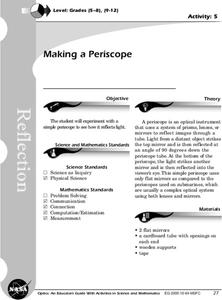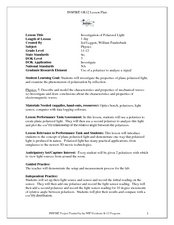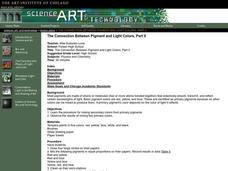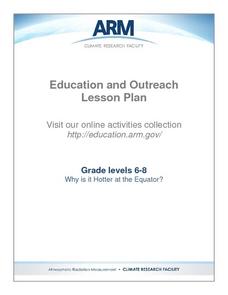Curated OER
Making a Periscope
Students experiment with a simple periscope to see how it reflects light. They draw a diagram of the path a ray of light follows as it travels from an object, through the periscope, and into your eye.
Curated OER
Mirror Writing
In this mirror writing worksheet, students follow the directions to decide which alphabet letters are symmetrical. Students use a mirror and a white light as they work in partners to trace simple shapes.
Curated OER
Investigation of Polarized Light
Students investigate how polorizers filter light. For this physics lesson, students record their data and plot their results using a computer logging software. They discuss practical applications of polarization.
Curated OER
REFLECTIONS OF SCIENCE
Students discover the different types of mirrors, their properties and some of their applications. They have already been introduced to some of the properties of light and have already experienced some of the different types of mirrors...
Curated OER
Super Gelatin
Students investigate the refraction properties of gelatin to calculate its index of refraction. They discover that as the light travels through the gelatin, its speed and wavelength also change. Students find th indes of refraction of an...
Curated OER
Making a Periscope
In this designing a periscope worksheet, students follow the directions to collect materials and make a periscope. Students answer 5 questions.
Curated OER
Enlightening Explorations, Part II
Sixth graders review their results from the previous experiments. After viewing a kaleidoscope, they make their own pattern on paper and describe the role of light. To end the lesson plan, they examine light being relfected and...
Curated OER
The Geometry of Real Images
In this math worksheet, students read the examples for using the techniques of mathematical modeling. They draw the angles in order to simulate the reflection of light while using a concave mirror.
Teach Engineering
Concentrated Solar Power
The seventh segment in an eight-part unit promotes the idea of concentrating the sun to increase the power of a photovoltaic panel. Pupils learn about devices used such as reflectors or lenses.
Rice University
College Physics for AP® Courses
Take a look at an organized physics course. The 34-section electronic textbook covers material in AP® Physics 1 and 2. Teachers use the text to supplement lectures and have the class work through the labs. Each section contains multiple...
Curated OER
The Space Cadet's Laboratory: Using Electromagnetic Energy to Study Astronomy
Students build their own spectrophotometer to study light. In this physics lesson plan, students explain the dual nature of light. They calculate the angle of incidence and refraction using Snell's law equation.
Curated OER
The Connection Between Pigment and Light Colors
High schoolers learn the procedure for mixing secondary colors from primary pigments and observe the results of mixing two primary colors.
Curated OER
Making a Pinhole Camera #1
Young scholars make a pinhole camera and see the effects of light travelling in straight lines have on images.
Curated OER
Making a Pinhole Camera #2
Students make a pinhole camera and see the effects that light travelling in straight lines have on images.
Curated OER
Enlightening Explorations, Part III
Sixth graders continue their examination of light. In groups, they make rainbows and examine the spectrum of visible light. They travel between various stations recording their observations about the behaviors of light. To end the...
Curated OER
The Reason for the Seasons; Science, Geography
Students think about what causes the seasons to change, reflect on what they know about seasons and how their lives affected by seasonal changes.
Curated OER
Tessellating Tiles
Second graders Make, name and describe, using their own language and the language of geometry, everyday shapes and objects. They create and talk about geometric patterns which repeat (show translation), or which have rotational or...
Michigan Technological University
Giant Mirrors
Did you know some retailers use curved mirrors in their fitting rooms to make customers look thinner? Pupils view themselves in convex and concave mirrors to understand the difference. The resource includes big ideas for multiple age...
US Department of Energy
Solar Cooking
Who needs a barbecue grill to cook hot dogs when you have the amazing power of the sun at your disposal? Engage young scientists in learning about solar energy with this fun activity that turns a used Pringles can into a solar powered...
EngageNY
Complex Numbers and Transformations
Your learners combine their knowledge of real and imaginary numbers and matrices in an activity containing thirty lessons, two assessments (mid-module and end module), and their corresponding rubrics. Centered on complex numbers and...
National Nanotechnology Infrastructure Network
Making a Liquid Crystal Thermometer
Introduce your classes to a fourth state of matter! Liquid crystals have a colorful sheen that changes based on different physical factors. Learners use this information to create a liquid crystal thermometer where the color of the...
Curated OER
Using Vegetation, Precipitation, and Surface Temperature to Study Climate Zones
Using NASA's Live Access Server, earth scientists compare the temperature, precipitation, and normalized difference vegetation index for four different locations. They use the data to identify the climate zone of each location using...
Curated OER
Why Is It Hotter At the Equator?
Students investigate the different heating effects of sunlight. They conduct an experiment that demonstrates the way sunlight strikes the equator, the poles and other parts of the globe.
Curated OER
Rainbow Science
In this reading comprehension worksheet, learners read five paragraphs about the science of rainbows. Students then answer several questions about the reading.

























